Leaving the Shadows of Sexual Assault
With the upcoming SCOTUS decision sure to overturn Roe v. Wade, our own healing is the fuel victims and advocates need to keep fighting for the world we want to live in.
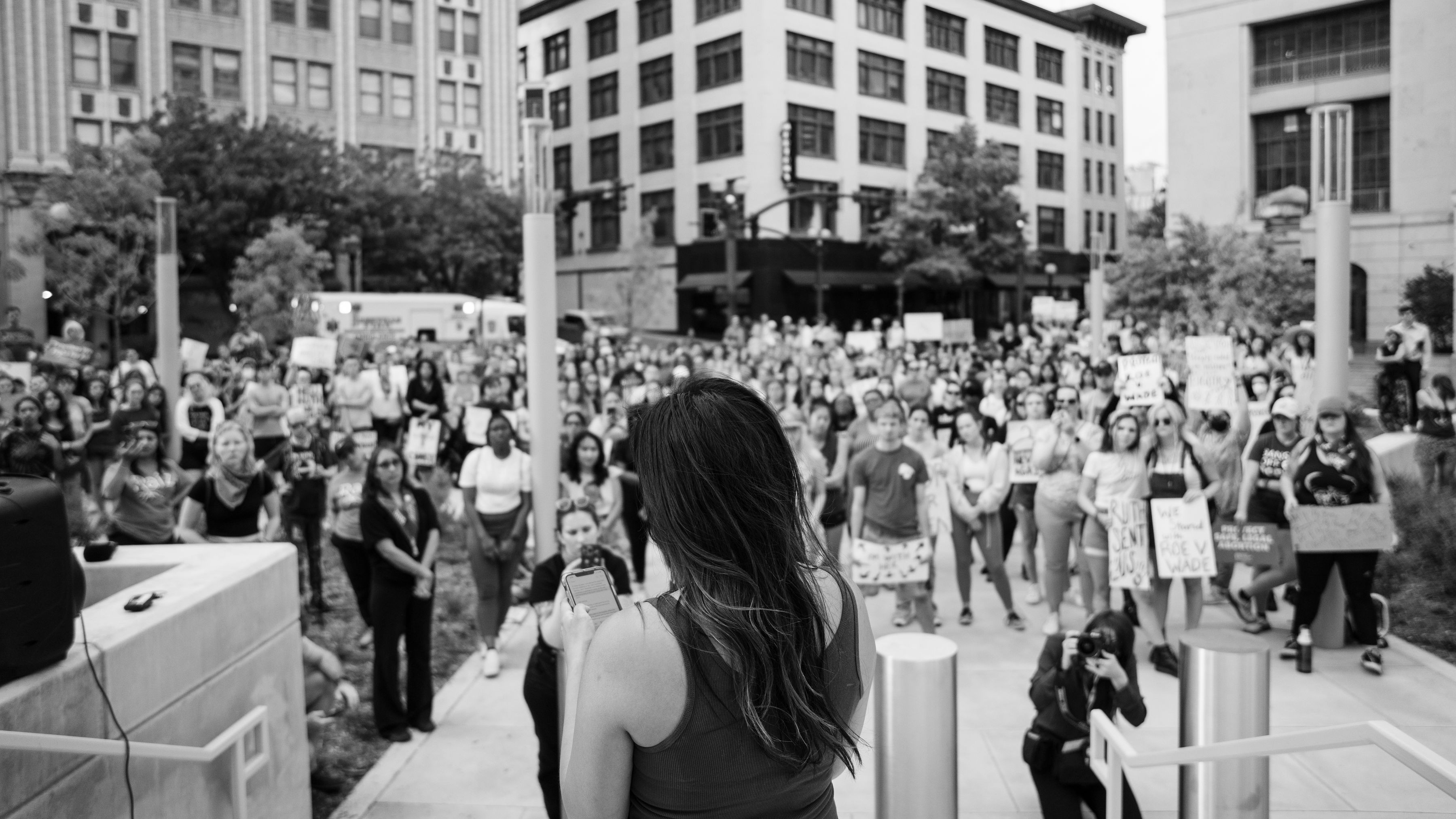
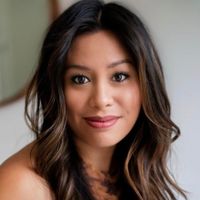
On a windy day in Nashville, Tennessee last month, I stood in front of the federal courthouse and shared a horrific story from my past with hundreds of people.
My 5-year-old daughter, Lily, was in the crowd that had gathered as a swift and furious response to the leaked Supreme Court draft opinion revealing the court was poised to overturn Roe v. Wade. It was Lily’s first rally since the start of the pandemic. Her eyes twinkled as she looked around, and I could see her being swept up in the raw emotions of so many uniting to stand up for our rights as women, and as people. Outfitted in a striped, smocked dress with a string of bright green party beads around her neck, Lily stood on a platform just a few feet away, listening closely, shushing others to be quiet as I spoke.
"If I close my eyes, I can still feel the sweat from his neck dripping on me," I said into the microphone, trying to steady my voice despite the unease that grew like a weed from the pit of my stomach.
Suddenly, I felt a shift in scene. I was no longer giving a speech to a crowd. I was being catapulted back to a different time in my life—a traumatic experience from my childhood.
From where I stood on the steps, looking down at the masses, all the unfamiliar faces had disappeared; replaced by visions of my own abduction and rape more than two decades ago at a budget hotel in Texas—and the resulting pregnancy I had to deal with as a 16-year-old girl.
When the faces of the crowd started to come into focus, I could see expressions of pain, shock, and horror from young teenage girls to older white men. And not a single sound. Wide-eyed in fear, I looked up to the sky and gulped the air, desperately searching for something—anything—to help me carry on.
As I finished the last words of my speech, the crowd cheered. Lily hugged me tight, filled with pride and beaming from ear to ear.
Get exclusive access to fashion and beauty trends, hot-off-the-press celebrity news, and more.
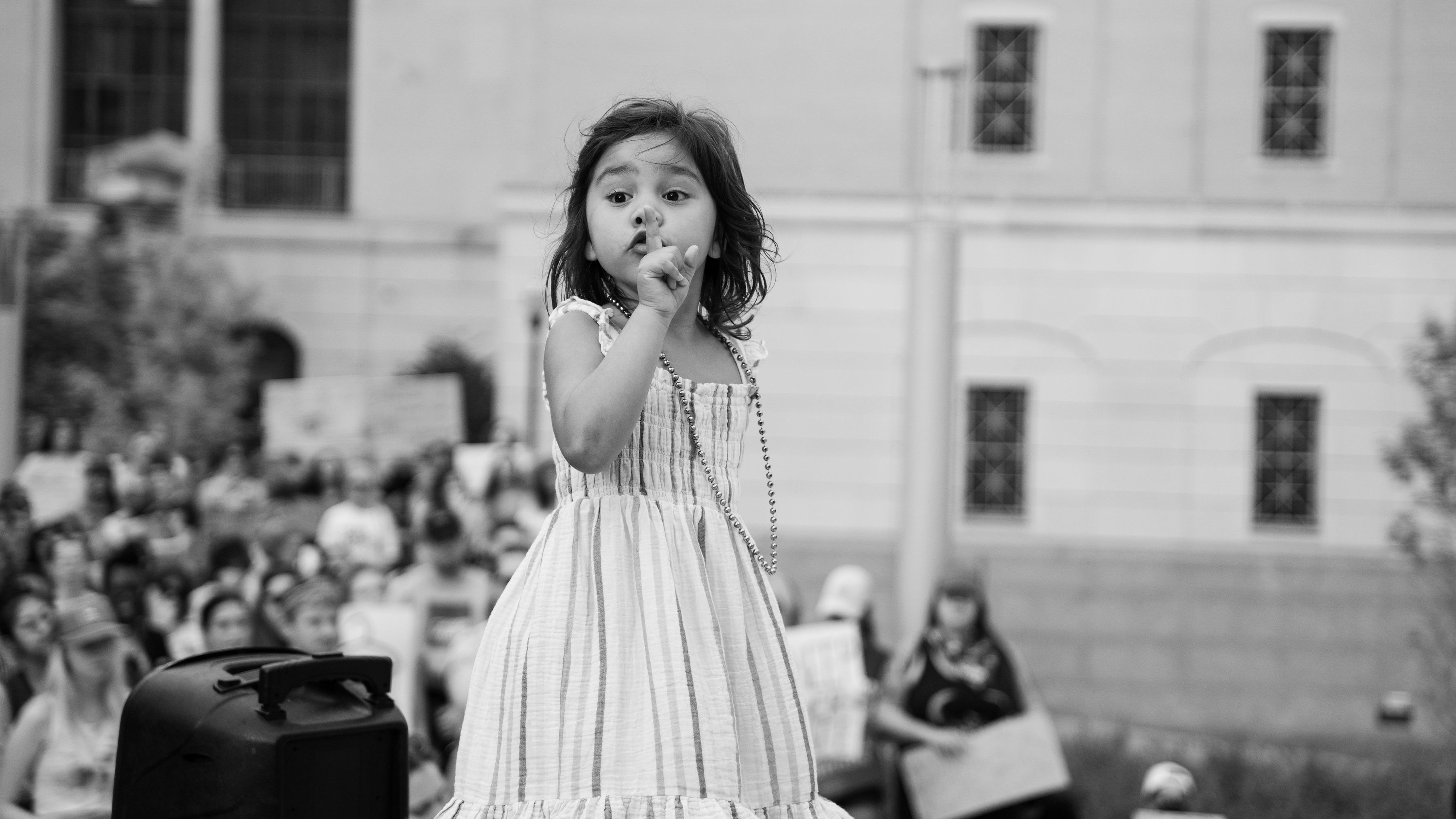
Lily, at the Nashville rally, shushing the crowd so her mother can speak. (Credit: Keturah Bishop)
People approached me at the rally and through social media to commend me for my bravery and strength. I felt comfort knowing I had an impact, and that my story gave people another perspective on the importance of abortion access. But what they didn’t see was a woman, who—upon sharing her darkest memory that day—had opened a deep, emotional wound.
For years, I spent my life living in the shadow of sexual assault. But four years ago, when Dr. Christine Blasey Ford shared her heart-wrenching testimony before the Senate Judiciary Committee about her allegation that then-Supreme Court nominee Brett Kavanaugh sexually assaulted her, it lit a fire in me to speak up. With the support of a good friend, we organized a rally for sexual assault survivors in New York City. The next day, in front of a crowd, I shared my excruciating story for the very first time. Since then, my advocacy journey has only become more powerful, as I have found great comfort, strength, and healing in the many venues available—from marches to Twitter—to share my experiences with sexual assault, abortion, and reproductive health.
Growing up as a first-generation Asian American for whom discussing and admitting mental health struggles were seen as a weakness, breaking my silence has been the most powerful part of my healing journey. I have learned that the truth can indeed set you free.
But on this blustery day standing in front of a Nashville courthouse—despite my years of advocacy and story sharing—a deep yearning pulsed throughout my body.
This day was different.
This day, Lily was watching.
I could feel how much more work needed to be done to unlock the deeper truth in myself. To create the emotional space to understand and validate my own thoughts, feelings, and even advocacy. That is where the real growth happens.
There were days when I would wonder: How could I, after all this time, still be haunted? How could I open my heart and fight for our rights when so much trauma continues to break it?
Adrianne Wright
For years, I felt like it would be impossible to untangle the intricate webs of trauma in my life. I didn’t know what I wanted to accomplish, so I didn’t know where to start. But, through therapy, I’ve started to unravel those webs.
I see two versions of myself. There is the Adrianne today: the adult, the advocate for women’s rights, who uses her pain to take action. She finds mobilizing to be cathartic and a way to protect herself—often using the swift actions of organizing to avoid sitting eye-to-eye with her emotional pain. This version of myself is determined, passionate, hopeful.
And then there’s the Adrianne of my past: the inner child, who was brutally raped and stripped of her voice by people she was supposed to trust. Raised in a strict immigrant household, she learned to be highly disciplined, to always triumph in the face of adversity—a byproduct of the generations before, who went through unimaginable sacrifices and heartbreak, and soldiered on as they suffered silently. This Adrianne struggles to validate her feelings, and worries that admitting mental health struggles would bring about perceived shame and weakness. This Adrianne is composed, quiet, afraid, alone.
When the adult version wants to speak up, the inner child hushes her to speak low. When the inner child is afraid, the adult version pushes her to step up.
For years, I thought having these multitudes meant something was wrong with me. I had labeled my inner child as "bad" and tried to push her down. There were days when I would wonder, How could I, after all this time, still be haunted? How could I open my heart and fight for our rights when so much trauma continues to break it?
The truth is, these dichotomies exist within us—they make up who we are today. But we have the opportunity to challenge embedded patterns and narratives from our childhood experiences, understand them with intention and grace, and allow them to coexist.
With the upcoming SCOTUS decision likely overturning Roe vs. Wade, ruling there is no constitutional right to abortion, our healing is the fuel we need to keep pushing for the world we want to live in.
Life is not about surviving, it’s about thriving. And when we acknowledge our multitudes, we set free generations of repression. We connect to our desires, and the vision for the life and the world we want. That is the greatest form of healing. Our greatest resistance.
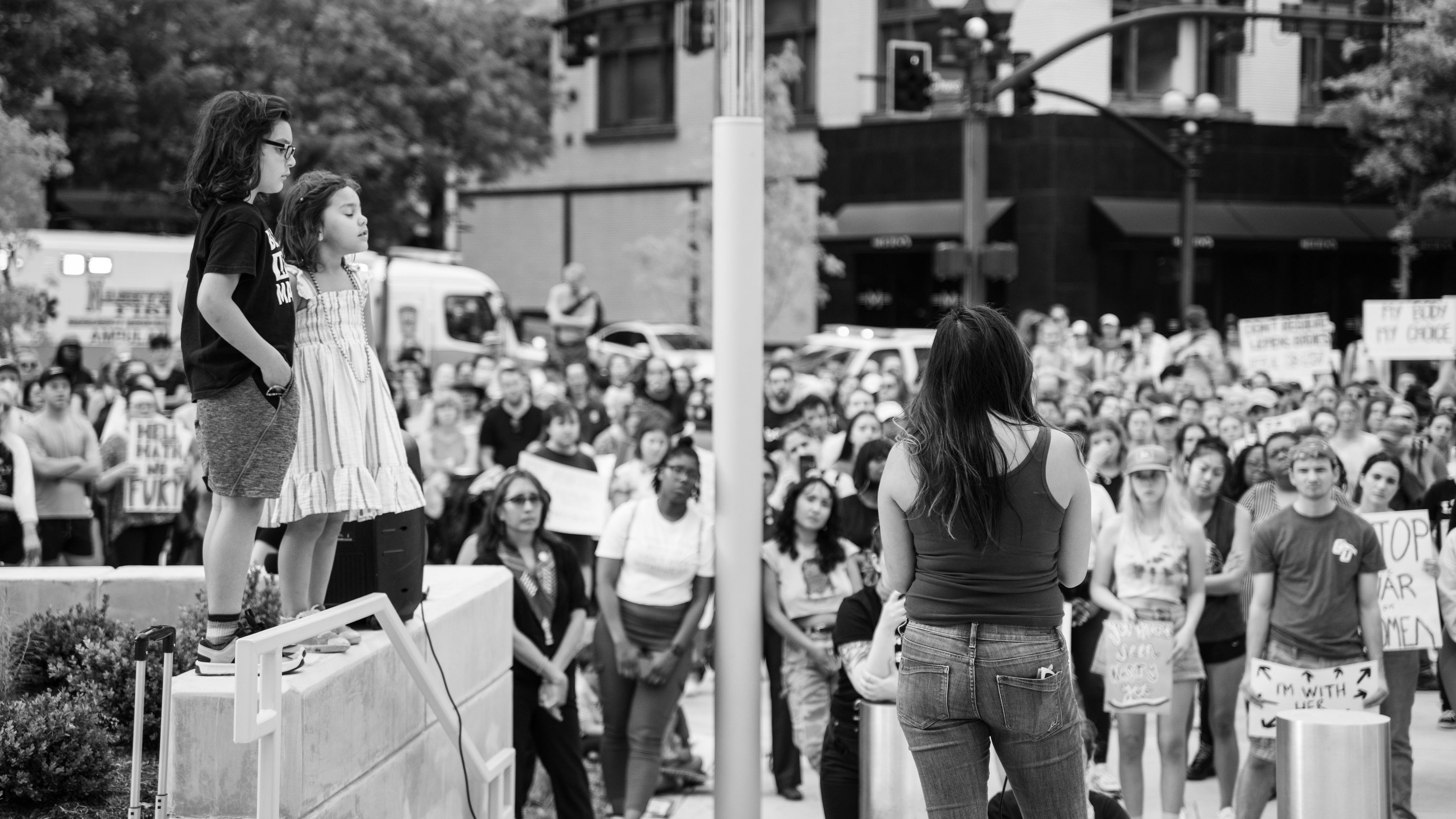
Wright at the May 2022 rally in Nashville, organized in response to the Roe vs. Wade leak. (Credit: Keturah Bishop)
After the rally, I went home and immediately slipped into sweats and got into bed, emotionally exhausted from the day’s events. I sat there in my bed, and I allowed the floodgates to open and my tears to fall. As I buried my face in my hands, my body heaving through the release of heavy sobs, Lily appeared at the doorway with a confused face and furrowed brow.
“Mama, why are you crying?” she asked.
I hesitated to respond, feeling guilty for putting my emotions on full display—as if I had given my daughter a false perception of myself earlier at the rally. Feeling the weight of my ancestors’ silence and the fierce love for my daughter, I knew I needed to break through that cycle of pain, and speak my truth.
“Because… sharing that story hurt my heart. And sometimes you just have to feel it in order to heal,” I said.
“Yeah,” she nodded. “Crying can be very good.”
She wrapped her arms around me, and gave me a hug I’ll never forget.
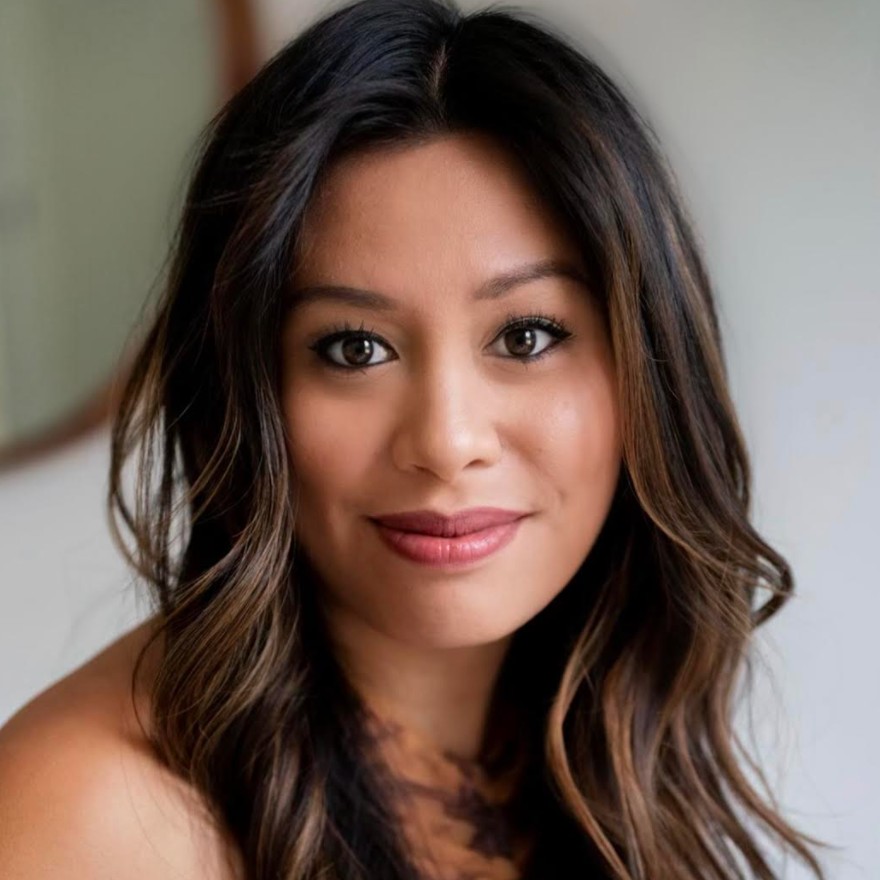
Adrianne Wright is the founder and CEO of Rosie, a storytelling agency for nonprofits, people and brands doing good in the world. She is also the Co-founder of I Will Not Be Quiet, a national community group that brings women together in intimate talking circles to learn about local issues, and take action. She currently lives in Nashville, Tennessee with her husband and two daughters.